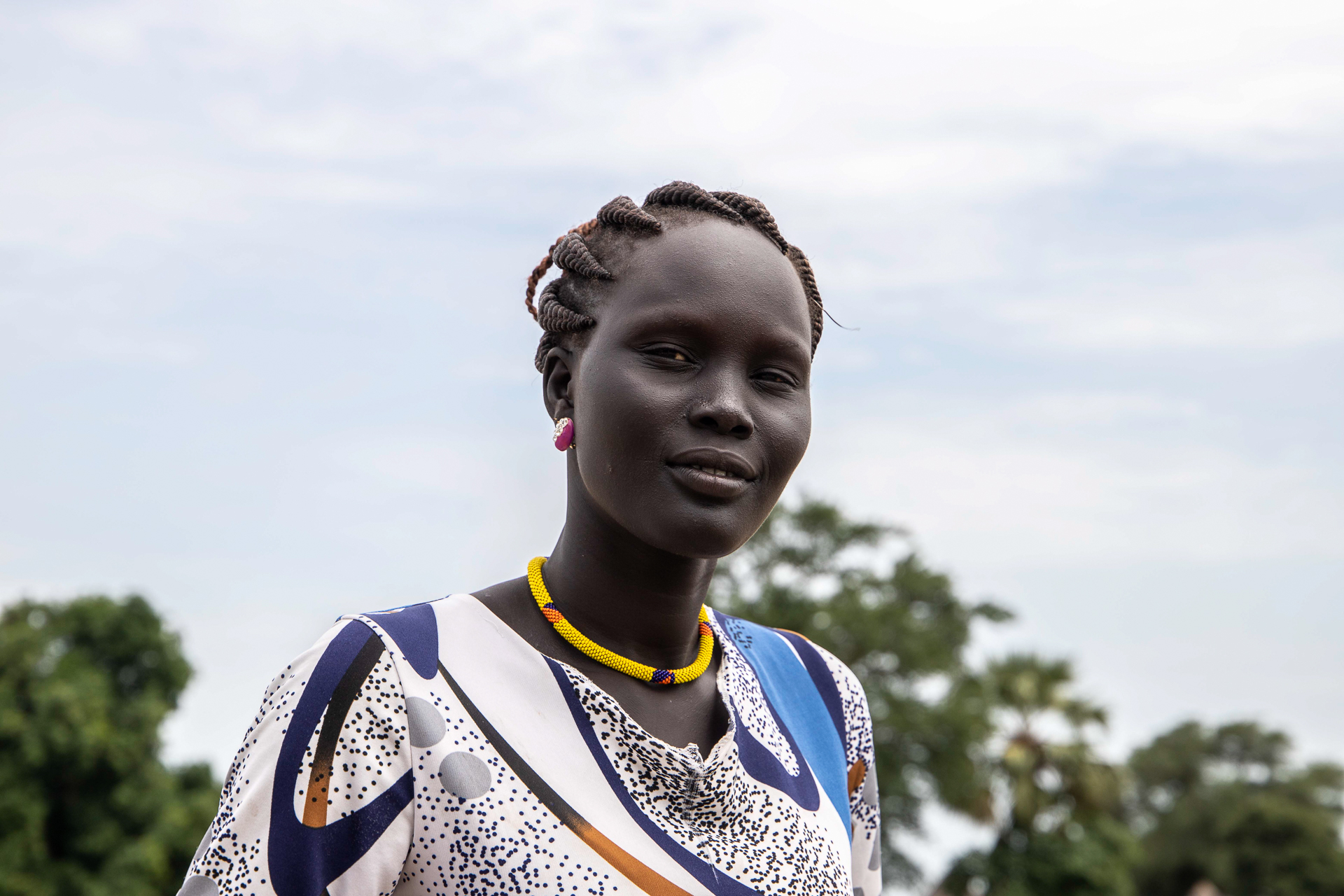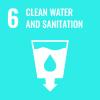Tonj South, 22 Nov 2021 – It is early morning in a small, remote village in Tonj South in South Sudan’s Warrap State when Ajok Miin Dut wakes to start her day. It is Saturday, a day for house chores, and she bundles up laundry, soap in hand, and walks to a borehole at Mabior Yar Primary School, a stone’s throw from her hut where she lives with her husband and their two children.
Ajok, 24, accompanied by her young son Tong, is the first one there but in no time, other villagers, mostly women, start to arrive to pump water for drinking, washing clothes and cleaning the house.

Ajok’s son Tong sits with his mother as she does laundry with water pumped from the borehole. Photo: IOM/Liatile Putsoa
How life has changed for the better. For a long time, the ease of fetching water from a nearby source –clean and safe drinking water – was unheard of. Residents relied on stagnant water from a natural well, which would dry up during stretches of drought.
“I used to have to walk for hours to get water for my family,” says Ajok. “The journey would take even longer because sometimes I would have to carry the baby.”
The daily treks to the well did not guarantee enough water for her family. “We would have to wait for hours and there were many of us. Sometimes we would end up fighting over the scarce water,” she says.

Life is a little easier now for Ajok Miin Dut, a resident of Mabior Yar village in Tonj South, South Sudan. Photo: IOM/Liatile Putsoa
Mabior Yar village, like many others in the Greater Tonj area, is in critical need of humanitarian assistance. Conflict and harsh natural disasters – seasons of heavy flooding or stretches of extreme drought – have left these villages in a fragile state, in need of safe drinking water, food, primary health care, mosquito nets and basic household supplies.
With broken boreholes and crops washed away by months of heavy rain, the Greater Tonj area faced a lack of water supply and extreme food insecurity, and some places were on the brink of famine.

These villagers are all smiles at a borehole rehabilitated by IOM’s Water, Sanitation and Hygiene unit. Photo: IOM/Liatile Putsoa
The International Organization for Migration’s (IOM) Water, Sanitation and Hygiene (WASH) interventions helped address food insecurity by increasing access to safe water through the rehabilitation of boreholes, hygiene promotion and the distribution of much-needed WASH items such as water purifying tablets, jerrycans and buckets.

The rehabilitation of boreholes in Mabior Yar village has given residents access to safe drinking water. Photo: IOM/Liatile Putsoa
IOM’s WASH team distributed items to more than 3,765 families, benefitting more than 43,000 people in the Greater Tonj area, primarily targeting households with infants being treated for severe acute malnutrition. To promote good hygiene practices and support menstruation management with dignity, menstrual hygiene kits were provided for women and girls of menstrual age.
The WASH team also rehabilitated 75 boreholes in communities, health and nutrition sites serving approximately 37,500 people, including people with disabilities. To ensure sustainability of access to the water supply, IOM trained 24 pump mechanics – men and women – and provided spare parts and toolkits for ongoing care and maintenance of boreholes.
“The training we had on how to fix the boreholes will ensure that we know how to fix them ourselves if they break,” says Malual Madut, the assistant head pump mechanic.

Malual Madut was among 24 people trained by IOM as water pump mechanics. Photo: IOM/Liatile Putsoa
As a self-driven initiative, the community has committed to make small contributions managed by the Water Management Committee so that money can be available for maintenance.
“It has been very humbling to see the communities organize themselves and put their hands together for a collective win,” says Inyasio Ngor Gum, the Administrative Officer for Mabior Yar payam (sub-area).
“For as long as I can remember, residents always came to us [local authorities] requesting support for this and that; so, it was very refreshing to see them being able to stand on their own. There is progress and we are encouraged.”
In Thiet payam, a neighbouring village where IOM also provided water, sanitation and hygiene services, residents say the rehabilitation of boreholes has lifted a burden.
Young Nyalok Loongar is especially excited as she says she will no longer “miss out”.
“I would have to leave school early and sometimes not go at all because I had to look after my siblings while my mother went to the river to get water,” she says.

Nyalok Loongar can now drink as much water as she needs. Photo: IOM/Liatile Putsoa
Kneeling under the mouth of the borehole, Nyalok cups her hands and takes multiple gulps of water while her friend pumps. In between gulps, Nyalok catches her breath and says: “When the pump was broken, we would get very thirsty, with only a small cup of water to share between us.”
“I am happy that my friends and I now have water,” says Nyalok.
This project is funded by the South Sudan Humanitarian Fund (SSHF).
This story was written by Liatile Putsoa, IOM South Sudan Media and Communications Officer, email: lputsoa@iom.int



